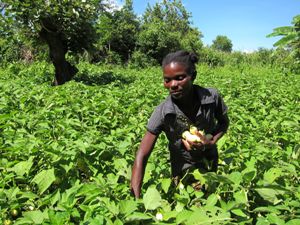For the second week of Lent (24 February – 2 March), our reflection is written by Fr Kelly Michelo SJ, who runs the home-based care (HBC) programme in Chikuni parish, rural Zambia.
“Jesus took with him Peter and John and James, and went up on the mountain to pray. And while he was praying, the appearance of his face changed, and his clothes became dazzling white.” – Lk 9:28-29
The second week of Lent invites us to see Jesus with new eyes. In Sunday’s Gospel reading, taken from the Gospel of Luke (Lk 9:28-36), Jesus is transfigured. As Peter, James and John contemplate the glory of God revealed in Jesus, and see Jesus transformed, they experience a transformation in their attitudes towards him.
We too are called to experience such transformation. Lent is all about transforming our attitudes and ourselves so that we can see Jesus more clearly. This transformation brings with it plenty of hope for the future. The Gospel expresses beautifully our hope for Lent – to become a new people.
For those of us who work in the AIDS apostolate, Lent is a time to view life with new eyes, new hope. The response to AIDS should be one of transformation, of transforming the lives of people living with HIV. At the Chikuni Parish home-based care (HBC) programme, we work to instil confidence in our clients, to build their capacity to become more skilled and empowered to seek out a sustainable income to support themselves and their families in the longer term.
Sunday’s first reading (Gen 15:1-12, 17-18), in which Abraham is promised the land of God, is also about transformation. God promises Abraham he will inherit land that will transform his life and that of the Israelites. God promises a new land and a new hope to the people of Israel.
In the second reading (Phil 3:17-4:1), we also see transformation: overcoming negativity and looking to the future. This perspective is deeply relevant for AIDS ministry. People living with HIV are called to overcome self-stigma and to change negative ways of thinking if they are to believe in and build a hope-filled future.
At Chikuni, we see evidence of change in people’s lives. Febby lives in Chona, a small rural community in Zambia, where most people depend on subsistence maize farming. When Febby first joined the HBC in 2007, she was completely bedridden. However, with support, she began to adhere to her antiretroviral treatment and eventually controlled the virus in her body.
 In 2012, Febby was recruited to join a self-help group of the Chikuni HBC. Febby attended training in sustainable gardening and small livestock management. She decided that she wanted to focus her energies on gardening. Febby planted impwa in her garden and applied the practices she had learned, like how to manage pests and how to fertilise without chemicals. Today she produces a large sack of impwa per day, which she can sell.
In 2012, Febby was recruited to join a self-help group of the Chikuni HBC. Febby attended training in sustainable gardening and small livestock management. She decided that she wanted to focus her energies on gardening. Febby planted impwa in her garden and applied the practices she had learned, like how to manage pests and how to fertilise without chemicals. Today she produces a large sack of impwa per day, which she can sell.
Febby used some of her income to buy her own goat. She also started raising chickens. At first, she had three chickens; today she has over 50. As suggested in the poultry management training, she mixes dried moringa, a leaf high in vitamins and nutrients, into the feed to produce healthier chickens. Her family consumes some of the eggs and chickens and she sells the rest to her neighbours. Seeing her success, some neighbours want to begin a similar business.
Febby’s biggest challenge is finding a market for her products. Impwa is a traditional vegetable that sells well in town but finding transport to get there can be difficult. She hopes that in future, she’ll be able to sell her produce to the HBC restaurant and local schools in Chikuni. Febby is also experimenting: drying her excess produce so she can sell it during the dry season.
Febby has transformed her life. As the impact of ARVs made itself felt, she actually began to believe in the reality of her extended life expectancy, and set about building a future of hope for herself and her family, with the necessary support.
Today, let us pray for grace for individuals and organisations that help HIV-positive people, so that they may take to heart their responsibility to encourage their clients to think about and plan for their future, especially now that funding for AIDS-related works is dwindling. Let us pray too for grace for HIV-positive people, that they may become ever more empowered and hope-filled role models in their communities. In this way, as they extend services and support to others, they may become the positive face of HIV, combatting the fear and denial that surround the virus and perpetuate its silent spread. Let us ask God for the grace of transformation towards a hope-filled fullness of life.
To read this reflection in French, please go here.
To read the reflection of the first week of Lent, please go here.
To read the reflection of Ash Wednesday please go here.

